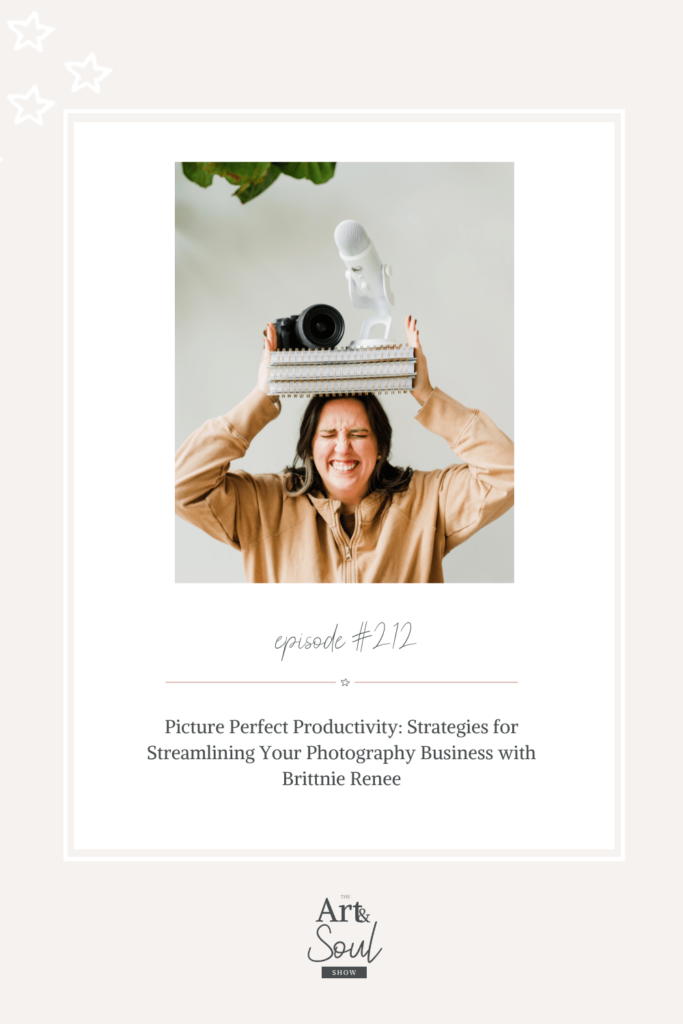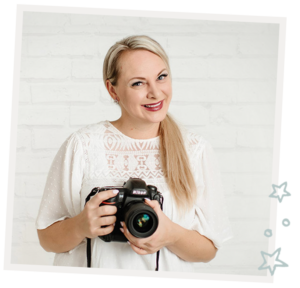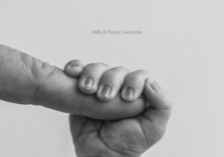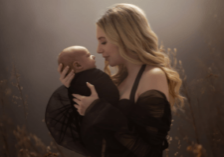Picture Perfect Productivity: Strategies for Streamlining Your Photography Business with Brittnie Renee
Does it ever feel like you’re working around the clock but still can’t seem to get anything done? There’s a common misconception that the more we work, the more productive and successful we’re going to be. But that’s simply not true!

In today’s episode, I’m interviewing Brittnie Renee, a professional family photographer and educator who helps her students leverage systems and intentional time blocking to streamline their businesses and optimize productivity in 15 hours per week or less! We cover her strategies for overcoming distractions, prioritizing tasks, setting healthy boundaries, and so much more! If you want to learn how to hone your focus and finally move your business forward without the burnout, then this is the episode for you!
So, get cozy, grab your notebooks, and tune in. I’m rooting for you, my friends.
What’s in this episode:
- [02:17] How to embrace systems when you struggle with organization
- [12:46] Time blocking a 15 hour work week and overcoming distractions
- [19:01] Conquering overwhelm, decision fatigue, and how to prioritize tasks
- [26:12] The importance of setting and maintaining boundaries to avoid burnout
- [29:14] The ways self-care can look different for everyone
- [38:19] Strategies for being more financially mindful
- [40:32] Tools and resources for working efficiently
- [44:42] Streamlining work with AI culling software
Tune in to this episode to learn how you can achieve more by working less.
SUBSCRIBE: Apple Podcasts | Spotify
Resources Mentioned
Capture the Chaos Planner – 15% off with code Lisa15 for US residents only
The 5 Second Rule by Mel Robbins
Profit First by Mike Michalowicz
Meet Brittnie Renee
Brittnie Renee is a mom of three living in the Dallas suburbs. She first started photography in 2009 and instantly fell in love with all things family and newborn photography. Brittnie is also the host of the Capture the Chaos Podcast, where she teaches photographers how to run their businesses in 15 hours per week or less.
Connect with Brittnie
Listen to the Capture the Chaos Podcast
Did this episode provide you with a roadmap for optimizing productivity in your photography business? Check out this episode Systems for Success – The Power of Streamlining your Photography Business with Annemie Tonken that shares how another photographer started their career!
Transcript
[00:00:00] Brittnie Renee: We see so much all at once that it’s hard to, like, narrow it down. And so for me, I learned a really long time ago that everything has to be written down, because if it’s in my head, it feels really overwhelming and it needs to keep it down. So that way I can start to like, puzzle it around. Like, okay, it did feel really big and I do have this really long list. But you know what? This isn’t as boring as I was thinking it was, but this one is. This one has a time limit on it has to get done now. So am I able to start seeing it in a more like productive way? And so for me, it’s writing everything down. [00:00:31][31.7]
[00:00:35] Lisa DiGeso: Welcome to the Art and Soul Show, where we dive into heart opening chats on photography, business, life and that messy in-between. I’m your host, Lisa DiGeso, a mom, a photographer and entrepreneur, and I’ll be sharing honest conversations and advice for photographers with insight on mindset, entrepreneurship, and creativity. The goal of this podcast is for you to be able to gain insights and strategies that will get you real results. Because let’s face it, having a photography business can be lonely, but it doesn’t have to be. This is the place you can go when you need a boost of encouragement, a kick in the pants, and inspiration to pick up your camera. This is the Art and Soul Show. [00:01:18][42.3]
[00:01:18] Lisa DiGeso: Hello my beautiful friends. Welcome back to the show today I’m super excited to dive into today’s conversation with Brittnie. Now, Brittnie is a mom of three living in the Dallas suburbs. She first started photography in 2009 and instantly fell in love with all things family and newborn photography. Brittnie is also the host of the Capture the Chaos podcast, where she teaches photographers how to run their business in 15 hours a week or less. So without further ado, here’s Brittnie. Welcome. [00:01:47][28.4]
[00:01:48] Brittnie Renee: Hi. [00:01:48][0.0]
[00:01:49] Lisa DiGeso: So tell us who you are and really what you’re passionate about. [00:01:52][2.2]
[00:01:52] Brittnie Renee: Well, like you said, my name is Brittnie. I am a mom of three kids. They are about to be ten, seven and five. So I, you know, I have my hands full in a different way than the baby moms do right now. Yeah, we live in Dallas. I’ve been here most of my life, and I really love teaching photographers how to be more productive with their time, especially when they feel like they’re a hot mess and they can’t get their life together because I resonate with that so much. [00:02:16][23.6]
[00:02:17] Lisa DiGeso: Oh, you’re preaching to the choir. I’m actually coming off a sabbatical. I’ll be starting to take clients in probably the fall, but I hit some really, really, really big burnout. Like, I was working Milky Way and I was working Milk and Honey, my photography business, probably 70, 80 hours a week, and it was too much. I ended up with thyroid issue and health issues, which basically my body was telling me it’s time to take a break. So I you were preaching to the choir when working for 15 hours a week in your business, so can you maybe share about systems and workflow? Because for photographers that really can become our Kryptonite when it comes to productivity. So what advice do you have for those maybe that struggle with organization and creating and sticking to systems? [00:03:02][45.3]
[00:03:04] Brittnie Renee: So I want to debunk a myth real quick. So I feel like we think that the more work we do, the more money we make. Or, you know, you can’t make more money unless you’re working more. Right. And I’ve learned that that’s not true. You know, I have not hit the level burnout where I’ve had to take an extended sabbatical. But I got really close, you know, and I knew that my my health wasn’t taking priority and my kids weren’t taking priority, and just nothing was in the order that it should have been in. And so I started learning that, you know, you could do more with less and. That’s honestly ideal. So we didn’t probably start. Most of us probably didn’t serve derby business so we could work 80 hours a week, right? Like that was not the goal. So I am not naturally an organized person. I am a type B, I am disorganized. I’m creative. You know, I’m just one of those people who just kind of resonates with being a messy brain and. I or my people. I feel like them just generally like how creative people are. Like, we’re just not. We don’t. I mean, I’ve met people who are like, oh yeah, I’m naturally organized. I’m like. Yeah, like do that. How’s that? How’s that born into you? So. Oh yeah. And I also I was diagnosed with ADHD whenever I was in seventh grade, and I was only medicated for one year. And I was like, we’re not doing this, we’re not doing this. And I know the medication has come a long way in the last 20 years since I was on it, but yeah, so like I said, I’m not naturally an unorganized person. And so I have really had to teach myself systems and organizations and workflow, and I could only add one thing at a time. Otherwise it felt really overwhelming to overhaul your entire life and your entire business. So it started in about, I think it was 2022. Whenever I was, I just kind of hit my my moment of rock bottom where I’m like, something has got to change. And so it’s funny, it started out with not even being anything in my business that I changed, but it trickled in to the rest of my life. And that thing that I did was started an evening routine. Not a bedtime routine, but like an evening routine where I just cleaned my kitchen at night and I tell everyone this that I work with them like you just start with, start there and then like, I don’t know how that’s going to help my business, but think about it like this way. So usually we’re working at home, right? We’re literally my office right now is in my bedroom. Like, that’s the space I have. That’s the space I make. So it is very, all very intertwined. So when I wake up in the morning and I wake up to a messy kitchen, I have to clean the kitchen before I can dive into anything else because I can’t make breakfast, I can’t get the kids ready for school. I can’t focus because my brain is just focused on how messy that kitchen is and how I’m not going to do anything else. And so I found that cleaning my kitchen before I went to bed at night allowed me to wake up and, you know, get the kids out the door, get them ready for school and jump right into work. So that, honestly, was the catalyst to changing everything else about my life. [00:05:58][174.7]
[00:05:59] Lisa DiGeso: I love that, I love that so much. I do the same thing, but almost in reverse, where it’s my bed. I have to make my bed in the morning, and I actually work in an office outside of my home studio. But if I don’t make my bed, I will think about it all day long. And then I come home, and then my room’s a mess, and it’s literally like clothes on the floor or pillows and the bed’s not made, but it feels like everything is a disaster. And until I know that’s done, I need it. Like that’s how I have to start my day. So I love that. [00:06:29][29.4]
[00:06:29] Brittnie Renee: We all have like, our thing, right? Like, I think my bed is not me. Actually, I tried making it, but my cat was sleeping in the middle of it. I was like, I’m just I’m not going to bother you. I’m going to leave the bed on for you. You’re okay. She’s so comfortable over there. So I wanted to leave her. But, you know, my bed doesn’t bother me because I’m also an apple. I take naps every day, so making my bed feels like a waste of time. So I’m like, I’m just yes to get back in it. [00:06:51][21.8]
[00:06:53] Lisa DiGeso: I love that. I love that. So you find what works. And like, I totally agree with you on the kitchen sink and the cleanliness of that. I’m like, just starting your day feeling fresh, I love that. So let’s talk about sticking to systems too, because I think that like, I don’t know about you, but I am also a little bit of a rebel at heart. And if you tell me what to do something, I’m probably going to do the opposite. And especially when I try to boss myself, I like to rebel against myself, even though I know it’s going to be good for me. So do you have any advice on that? [00:07:23][30.6]
[00:07:24] Brittnie Renee: I’m also a natural rebel like my mom. She’s that poor lady. I had her hands full with me because literally anything you ever tell me to do, I’m going to do the opposite. Yeah. Just am. And so she thinks it’s really funny now that, you know, I’ve made a plan or I’m like, this organized or I am a recovering organized person, or I’m trying to be organized, whatever you want to call it. And she’s like, if you would have told me this when you were 15, I would have laughed in your face like, this is so bizarre. I’m like, I know, I know, I mean, it’s stuck in there. It just took me a long time to be like, maybe you were right, mom. You’re right. So I like to tell myself, this isn’t homework, that we are our own boss. There’s no one hovering over us telling us you have to clean your kitchen and that you have to make your bed. You have to send that email. You have to do these things. But I’ve learned that and I’ve learned this firsthand, because if I don’t clean my kitchen at night, I wake up the next day and everything is a mess. So when I think I don’t really feel like doing it tonight, I remind myself, Brittnie, what is going to happen when you don’t and who is going to suffer? You are going to be the one that suffers. And so it’s kind of like a mind, a mind shift game where you have to change. It’s not that I have to make my bed in the morning. It’s not that I have to clean the sink full of dishes, it’s that I get to, and it’s going to make my life easier tomorrow. [00:08:43][78.4]
[00:08:44] Lisa DiGeso: I love that. Have you read the book by Mel Robbins? I think it’s the five. It’s a five second rule, and it’s it’s like a countdown. It’s like five, four, three, two, one liftoff. And you just go do the thing. I use that to get out of bed every day. Yeah, like it’s so funny. Like that’s the only way literally that I. Been able to, like, just get out of my head and just go do things. It’s been so like, if listeners out there, if you’re listening, check out the five second Rule by Mel Robbins. It is such a good book because otherwise I just don’t. [00:09:14][30.1]
[00:09:17] Brittnie Renee: Well, I mean, whenever you’re a procrastinator, that’s like, I’ll do it. Like, I got time, I got there. I recently learned this new law. It’s kind of law. It’s Parkinson’s law. It’s not, you know, different than the disease. Just to clarify. So it’s Parkinson’s law, and it’s basically the more time you give yourself to do something, the more space the work takes up in, the more complicated it becomes. And so if you say, okay, you know, if you give yourself a month to get a task done, it’s going to take the entire month. But if and the task might only take you an hour or 30 minutes. So if you give yourself a smaller amount of time, you’re going to get it done faster. And it’s just really fascinating cause it’s so true. Like when I give myself these, like, really long timelines or, you know, I have to be like. You are getting. I give myself to get out of bed at 630 rule. So my alarm goes off at 620. I look at my phone for a little bit, and I mean, that’s not the ideal thing to do when you wake up, but it’s what I do and I’m going to keep doing it for now. So but I say at 630 it doesn’t matter. You’re getting up and you go get these, get ready for school. And so I give myself this like hard deadline. Otherwise you know, six 3645 would roll around. You know, like maybe right scrolling TikTok. My then my day starts off ruined if I spend too much time like immediate, like I have a headache and I have like brain fog. And so it’s just not good. But I give myself that deadline. Giving yourself a deadline and and a small deadline. Don’t make it. Don’t make it something ridiculous and huge because the space will fill itself up totally. [00:10:41][84.2]
[00:10:42] Lisa DiGeso: One thing I started doing a few years ago is when I started booking my sessions. I started booking my editing time right in my calendar because what I was finding is I would say, okay, I’ve got like, I’m a slow editor, I’m going to take four weeks to get your pictures back to you. But then I know that I could do them probably in about, you know, 6 to 8 hours the entire thing will be done. But then I think about it for four weeks instead of actually doing it, and then I leave it to like the 28th day, and then I spend like the day doing it. And then what I figured out is if I just schedule it in, like do the session three days later, I have this window of time where I am either doing half of it or I’m doing the whole thing and it’s done. Oh my gosh. Like it changed everything and especially for my brain. Not like spinning on it because then I use that for other processing things. [00:11:31][48.4]
[00:11:32] Brittnie Renee: So that’s funny that you do that because I have to start doing the opposite. I had given myself this pressure to get the sessions out so fast, and then I was just constantly playing this catch up game of trying to get my sessions out faster and not doing anything else. So like I couldn’t get blog post written, I couldn’t, you know, send client. I just I didn’t have any time for everything else. So I’m like, I have to get this session out right now. But it’s smart that you are scheduling the time, like being intentional with when you were going to do it. And that kind of like brings into the idea of time blocking, which I’m a huge time blocking fan. Do you time block? [00:12:04][31.7]
[00:12:04] Lisa DiGeso: Yeah. Time block and batch like that. Just batch everything. It’s like if I’ve got five sessions that I that I need to get done, I will actually cull all of them at once. So I’m going through all of them and it’s just like culling day. And then I schedule the time to do like all the other things. Right? Yeah. And it’s just like it’s just like when I can work in batches. I even batch my son’s lunches like on Sundays. We will just make all the lunches for the week, put them in. And so every day he just has to grab them. And so anything that I can find a way to batch like it’s such a time saver, right? [00:12:34][29.7]
[00:12:34] Brittnie Renee: Yeah. I’m a I’m an addict when it comes to batching things like, like what else can I try? What did I do well together? I love it, it is it’s it. It really is a time saving time. So I think it’s amazing. [00:12:44][9.9]
[00:12:46] Lisa DiGeso: So I want to talk more about the 15 hours a week. So how have you gotten it down that you’re able to run a business in 15 hours a week? [00:12:53][7.5]
[00:12:54] Brittnie Renee: So it kind of goes back to that Parkinson’s law, where the more time you give yourself, the more space you fill up. And so 15 hours a week is what I gave myself. Or, you know, it’s generally what we can get. We can get the work done in that amount of time. And it’s not too much. It’s not 40 hours. It’s not any time, you know, staying up until all hours of the night. It’s like very specific time blocks. That’s where the time block comes into play. So for me, my work time blocks is when my daughter is in school, which is Tuesday, Wednesday, Thursday from 9 to 1. And so Tuesday, Wednesday, Thursday from 9 to 1. My work time is my sacred work time. I’m not going to plan to go, you know, to the gym during this time. I’m not going to do or do anything else. I’m not going to do chores, is I sit down and I work and I focus on just doing that, and I let it fill up the space in the time. So just setting those work blocks into place was the first step for me. And I don’t want to, like, overwhelm people because I can go into like on, you know, then do day blocking and then do like I don’t want to overwhelm you. Just so for starters, just give yourself that smaller work blocks that you’re like, not going to do anything else. I’m just going to work during those times. [00:14:02][68.2]
[00:14:04] Lisa DiGeso: And you find I know because I’m sure I have ADHD, I haven’t been diagnosed, but I find a lot of the time I really bump up against, especially when I know I’m supposed to have this focus. Work time is context switching and like trying it. My brain’s like, oh, but maybe I’ll just check something up here on my phone. Or maybe, oh, I bet I better just check my emails right now too. Oh, oh, Slack’s going off me, I need it, my team needs something and I’m just like, so reactive. So do you have any advice for those that may also be struggling with the distractions and really getting focused and laser focused on that time that you’ve scheduled between that 9 to 1 period? [00:14:37][33.2]
[00:14:38] Brittnie Renee: Yeah. I, I’m exactly like that. And I’m laughing because one day I sat down and I had intentions. Do you know, I had my little To-Do list over here? I was like, I’m going to do this today. But then I sat down to update an email workflow, and then I was like, well, if I update that, I have to update this website on my page. And then if I do that, I have to go through and clean out my email subscribers for this. And then if I do that, I have to go do. And it turned into like 3 or 4 hours of me doing everything but what was on my to do list. I mean, it was very productive. Okay. Like I got a lot done. No, that’s not what I planned to do. And so having one, having a plan and then also reminding yourself to stick to that plan and not get distracted by everything else. So here’s what I have to do with myself is I did mention de blocking a little bit. Like I kind of focus on certain tasks each day. Like Thursday is this podcast day for me. Tuesdays is marketing day where I sit down and I plan out all my Instagram content and my, you know, just what I want to be talking about that month. So just that right there has helped me, you know, stay in my lane like, oh, I don’t need to go talk about podcast stuff today because that’s on Thursday. I can save it for then. I’m going to forget though, right? So I have a little notepad next to me, and whenever one of those intrusive ideas pops up in my head, I write them down. So that way I can come back around to it later. And I also have to turn off my notifications for everything if I’m supposed to be focusing on something. So my computer or my phone go into focus mode because I see an email come in, oh, I need to go do this now. Oh, someone needs me. Oh, I need to go do this now. Like it just it’s so you go down that rabbit hole and it’s insane. [00:16:08][90.1]
[00:16:09] Lisa DiGeso: So do you ever I think I said that’s such good advice that like, turning off the notifications is so huge. And it’s, it’s funny because my son, he’s, he’s 14 and so he’s in grade nine and I am amazed like they haven’t taken phones away in school and they don’t mandatorily say turn off your notifications like we we actually have to the point where I’m like, you know what? I actually don’t want him to have it in class. So he actually turns it into the guidance counselor. So he like we just said, no, you don’t get to have it in class, because if he just can’t control himself and he will be on Snapchat all day long. And it’s not that there’s anything wrong with him, it’s just that that’s the way it’s designed. Yeah. And we’re giving these kids and then we’re sending them to school and we’re expecting them to learn. But even as adults, like we struggle with it. Right, exactly. [00:16:55][46.6]
[00:16:56] Brittnie Renee: I’m really glad that we didn’t have I mean, we had phones in school, but they had a $15 fine rule. So if your phone went off in school or they saw it, then we had to turn it in and pay $15 to get it back. Oh, where that money went? Like, what did they do with that money? Right. Sure. I know I paid a lot of money. [00:17:12][15.9]
[00:17:12] Lisa DiGeso: For teachers drinking fund? [00:17:14][1.6]
[00:17:16] Brittnie Renee: Right? Right? All right, everyone, here’s the divvy up from the cell phones this week or so. You know, stock our bars. And we didn’t have social media, so there wasn’t I don’t know what I was doing on my phone. Like, what do we have phones for? [00:17:27][11.4]
[00:17:28] Lisa DiGeso: I graduated in 1995. Yeah. So like I’m old, but like we didn’t even have like barely computers. Like, my first computer was like a Tandy. Like. Yeah. We didn’t even have the internet like that here. [00:17:43][14.8]
[00:17:44] Brittnie Renee: And now you’re seeing your son go through this and you’re like. And we want to be like, well, we didn’t have that. We didn’t have typing class. We didn’t have, yeah, internet things when we were in school. And so we want to force that on them. But really they have to learn how to use this stuff appropriately because it’s so part of their life. Now we have to learn to deal with this, because this is a part of our life and it’s not going away. [00:18:05][21.6]
[00:18:07] Lisa DiGeso: So what’s really crazy is he is funny because he he sent me a message yesterday. He was really upset. He’s like, mom, I had to take my phone to class because we needed to look up stuff. And they don’t have Chromebooks in this class, and I’m worried that I’m going to get in trouble, that the guidance counselor is going to tell you that I didn’t turn it in. And I’m like, oh, baby, I’d like I appreciate you being honest, but like, if you need the resources, like, we will figure this out. Like we can get you a Chromebook for school if that’s what you need. But like, my goodness, like, I just you’re trying so hard to, like, put him in an environment where he can learn. Yeah, but sometimes the whole system is kind of just broken and betting against it. Bizarre. Yeah. Anyways, this is a totally this is an ADHD conversation. No, we could go we could go on that. We were like tangenting so hard. [00:18:49][42.5]
[00:18:51] Brittnie Renee: Do we need to prove to you that we have attention issues? Perfect example. This is proof. [00:18:55][4.4]
[00:19:01] Lisa DiGeso: I love it. I love it. Okay, I’m going to circle back to talking a bit. Actually, I want to circle back to overwhelm because I think that especially with people with ADHD, especially artists, this is something that we really, really struggle with, especially when it comes to like deciding what to do next or even figuring out what is the next priority. Like we’re always just jumping around and then everything overwhelms us. So do you have any strategies on that? [00:19:22][20.9]
[00:19:23] Brittnie Renee: Well, I just want to address that. I feel like sometimes when you’re told that you have a learning deficit or you know, you have ADHD or whatever, the other kind of disability that you have, it’s kind of when I got told that, and then they start handing me tests with like answers marked off of it, and I was like, I’m not dumb. Like, I know the answer to these. I don’t need you to cross off 50% of the answers for multiplication. So I was feeling like, oh my gosh, they think I’m really dumb. And as I’ve gotten older, I started realizing that like, no, I’m not, I’m not. I would not be able to run this very successful, not just one successful business, but multiple successful businesses. If I was dumb, like, I just wouldn’t be able to do that. And so I learned that I’m not dumb. I my brain just works differently than other people’s. And it’s kind of a superpower. If you Google how many entrepreneurs have ADHD? Like how many are really big successful ones? A lot like is it we are more likely to start our own businesses, civil. And multiple teams. Actually, I think we both we both have multiple. Going on with us right now. Like because that’s the way we are and we’re able to get out of the tedium in a way, and we’re able to just kind of see everything all at once. It’s like, I imagine us like looking at it like seeing the entire universe all at once and just understanding what it’s all like. Yeah, but then also don’t, like snaps back and we’re like, okay, that was way too overwhelming. Yeah, that’s kind of how my brain works for what I think. I think whether it’s true or not. But we see so much all at once that it’s hard to like, narrow it down. And so for me, you have to find like your own coping strategies. Right? And for me, I learned a really long time ago that everything has to be written down, because if it’s in my head, it feels really overwhelming and you don’t. So that way I can start to like, puzzle it around. Like, okay, it did feel really big and I do have this really long list. But you know what? This is as important as I was thinking, it was so. But this one is this one has a time limit on it has to get done now. So am I able to start seeing it in a more like productive way. And so for me it’s writing everything down and that becomes the key. There’s this method. Oh my gosh, I cannot think of what it is. But it’s like you put it into four quadrants. It’s like needs to do right now. Don’t need to do it all could do later. Whatever it is. I can’t remember what it’s called, but it’s you. Kind of. You like doing that with your to do list whenever you write things down? [00:21:42][138.6]
[00:21:43] Lisa DiGeso: Totally. It’s that one where it’s like it’s urgent and important or urgent. Not important. Important and not urgent. Yeah. And then not. Not important. Not urgent. I think something like that. Something like that. And I’m like. But everything’s urgent. [00:21:57][14.6]
[00:21:58] Brittnie Renee: I know exactly, exactly. [00:21:59][1.0]
[00:22:02] Brittnie Renee: For me, it’s like, okay, my client stuff, my client facing things are urgent like that one that needs to happen. That’s something. It has a deadline. It needs to happen now. So I know that my client things go in that quadrant where it’s important and then, you know, things with deadlines, obviously, like if it’s a week away, I don’t have to focus on it right now. I can focus on it later. But, you know, just kind of like prioritizing and that’s yeah, kind of hard whenever you have it all in your head and you’re trying to like. Now it all. You’re like that. This is bodily sense. So writing it down is huge. [00:22:32][30.4]
[00:22:33] Lisa DiGeso: I can’t remember we heard it once, but someone once said, your brain is not a storage container, it is a processor. And it’s like, you know, like how like I love to just download things and just save them on my hard drive. And then all of a sudden I’m mad because Photoshop open like I’ve got the rainbow wheel going on, and it’s like our brains are kind of like that too. If we don’t thought download or like just get brain dump out onto paper, our brains get gummed up too, and our brains get overwhelmed like that. And so as soon as I started to think of it like it’s a processor, not a storage container, I was like, okay, like, don’t leave it in there, right? [00:23:11][37.9]
[00:23:12] Brittnie Renee: You’re so right. And have you ever have those days where you’ve had to, like, make a thousand decisions, how to like, do it just so many different things. And at the end of the day, you’re like, my body’s not tired, but my brain is tired. [00:23:22][10.3]
[00:23:23] Lisa DiGeso: Yes. [00:23:23][0.0]
[00:23:24] Brittnie Renee: There. I mean, I used to feel like that every single day. Like I’m making decisions all the time. And every time you make a tiny decision, what do I want to eat for lunch? Or, you know, what task do I need to do now that I’m sitting down at my computer to work? You’re making a decision and that is brain power that you’re using. You know, you’re you’re processing or you’re storing or whatever. So creating routines and plans ahead of time. Yeah, literally will take away that brain power you need to use and free up so much more. So like when you sit down on Sunday and you meal prep for the week, you’re taking that off of your plate for the rest of the week, or when you day block or time block when you’re like, I know that at 9:00 on Tuesday when I sit down to work, I’m diving into Instagram posts or whatever, whatever it is for you. So you’ve taken away that brainpower that you need to use and you automatically just it’s not a decision anymore. It’s boop. This is what I do. And I think that’s like an under value like routines or undervalue special whatever. Especially when you’re I’m a free thinker. I’m creative. I can’t be contained, I don’t rebel, I’m not gonna follow a schedule. But when you start. You know, finishing up the day and you’re like, wow, I don’t feel tired today. My brain’s not tired anymore. It’s like, okay, all right, I’m starting to figure this out now. I see what you’re doing. [00:24:37][73.3]
[00:24:38] Lisa DiGeso: Totally. Yeah. You’re no longer living with that decision. Fatigue, I think, is what they call it. [00:24:41][3.1]
[00:24:42] Brittnie Renee: That’s the word. Right? [00:24:42][1.0]
[00:24:43] Lisa DiGeso: Because. And it’s interesting because Steve Jobs, he wore the same outfit every single day. So he wasn’t having that decision of what I’m going to wear today. He had like a hundred black turtlenecks because he didn’t want to make that decision. And what I started doing is I got this app on my phone and because I, I lost of weight and then I went shopping and I was like, okay, I want to dress nice every day. But I also like get overwhelmed at my closet. So I had this this app where I like, make my outfits and then I pick the outfits I’m going to wear for the week on Sunday. And I’ve already decided what I’m going to wear for the week. And it’s so it’s kind of fun, right? [00:25:19][35.6]
[00:25:20] Brittnie Renee: Yeah, that is so fun. [00:25:21][1.1]
[00:25:21] Lisa DiGeso: It’s like it is like, remember like the movie clueless. That’s it. Yeah. An app like that where it’s like her closet. And so I just like do that on Sunday and I’m like having fun. Like, what am I gonna wear it? [00:25:30][8.9]
[00:25:31] Brittnie Renee: That’s, I mean, my I’m like Steve Jobs and I just wear, oversize t shirt and leggings every day. But one day I really do want to, you know, start that I like being comfortable. I have, like, sensory things. I don’t like jewelry I don’t like. [00:25:44][13.4]
[00:25:46] Lisa DiGeso: oh yeah, I hear you. I had to get everything has stretch, everything has stretch. It may be pretty, but it’s stretch like everything is stretch. [00:25:52][5.4]
[00:25:53] Brittnie Renee: Absolutely, absolutely. [00:25:56][2.1]
[00:25:56] Lisa DiGeso: Oh my gosh. I love this conversation because we have tangented so hard already. [00:25:59][2.5]
[00:26:01] Brittnie Renee: You sent questions ahead of time and I don’t think we’ve touched on any of them. But we have touched on so many good stuff already. [00:26:06][5.3]
[00:26:12] Lisa DiGeso: I love it, I love it. So I want to talk about boundaries because this is something I think a lot of us really, really struggle with and saying no, especially when it’s important to maintain focus and productivity. Like for example, getting a lunch date request from some girlfriends when you know it’s work time. So how do you handle setting those boundaries and maintaining them? [00:26:31][19.0]
[00:26:31] Brittnie Renee: Well, for me one, I have to prioritize things, so there are some days that I wake up and I just know that even though it’s supposed to be a workday, I need rest. And it’s kind of hard when you’re like, okay, well, I’m going to always honor honor my boundaries. And my boundaries are that Tuesday, Wednesday, Thursday is my work day, right? But then you wake up on Tuesday and you’re like. I don’t think I’m going to be very productive today. Right. And so I know, I know, I, you know, have to have that limit for myself to be flexible enough in my boundaries to know that I can take a break and it’s okay to take a break without feeling guilty. But at the same time, if it starts happening every day during work days and I’m like, oh, I’m too tired to do it again, then that becomes a problem. So I know boundaries kind of get really blurry. There are some things that we can have really hard boundaries on, right? Like, I am not going to take sessions on Sundays and I don’t take sessions on Sundays. Unless. And then that’s when the alarm starts happening. You’re like, oh, just kidding around. I’m working every Sunday. What been? I thought I had a boundary with that. And so. [00:27:38][66.6]
[00:27:39] Lisa DiGeso: Have you been talking to my husband? Like, it’s because I think because I did that a couple months ago and I was like, I’m not taking Sunday sessions off. My husband’s like, you’re working every single Sunday. I’m like, you’re right, I am. I did not stick to that boundary. [00:27:51][12.6]
[00:27:52] Brittnie Renee: Yeah. No, there’s no one. That’s the hard thing about being an entrepreneur. And like a small business owner is there’s no one telling us what we can and can’t do. So we can do whatever we want to do. And that is a problem. Yes, because you have to you have to honor your boundary or know that you’re going to pay for it. So if I decide not to work on Tuesday, I’m going to be behind it. I might have to work later. One day when I didn’t want to stay up late working because I need to get this done. And so I think. One. I just I’m such a great gray area person. Like I don’t have black and whites, and I bet you were expecting me to have, like, a really hard boundary or something. I have no hard boundaries, but. One. Be honest with yourself. Is this something that you need right now? Do you need to take a break and go have some social time? Do and go to lunch with that friend today? Or is it like, if I don’t do this, if I don’t sit down and do the work that I have done today, I’m going to have to stay up later on Thursday. So it’s always, yeah, like a given, a take with everything. You know, sometimes we really do need that social time. Sometimes we really do need rest, but sometimes we know we need to get the work done. And so I think it’s being honest with yourself and prioritizing what needs to be prioritized. I just can’t do hard boundaries with anything. I just it’s me. For me, it’s more of like, okay, how is this going to affect me later when I don’t do it like this? [00:29:13][80.9]
[00:29:14] Lisa DiGeso: I love that. That’s a really good answer, because I think we are so hard on ourselves because we’re trying to be so like we’re trying to hustle what we’re working with, the hustle culture. We’re trying to have those six figure businesses, right? Like we’re trying this is what we’re taught and this is what we’re told what success means. And I had to come out the other side kind of figuring out that I have to come up with my own definition of what success feels like for me. And I realized while I was in this complete cycle of major burnout, saying yes to every client and working, you know, Milky Way as well, I wasn’t having any fun. Like, I wasn’t even scheduling anything that I enjoyed to do for fun. Like, I love both my jobs. Like, don’t get me wrong, it is fun to do what I get to do, but I also like that’s how I make my money. So not scheduling the fun has a cost, and I think that as photographers, we really forget that we need to have that lightness, that fun with new experiences in order to give ourselves that rest and that life blood that we need for running a business. So do you schedule in your fun? [00:30:15][60.6]
[00:30:16] Brittnie Renee: I am such a homebody. That is. Yeah. If no one told me to go out and do anything, I would just be at home all the time. I’m fortunate enough that my husband, he’s like, okay, it’s the weekend, let’s go do something. And he like, drag in the house, like kicking and screaming. And I’m really grateful for it because I wouldn’t do anything. I think it’s sometimes my, my hobbies, like if you were to ask me what my hobby is, well, it’s doing DIY projects and then never finishing them and then. Same. Also taking naps. I really, really is. I don’t nap because I need naps. I just love being in my bed. Yeah, and sleeping well. And so I do acknowledge that I’m like, okay, you know, I need to do things with my friends and like, you know, cultivate those relationships that I also am fortunate that my husband, I also don’t have a lot of space in my life right now for. Because I will get overwhelmed and over overstimulated. Overstimulated if I’m having too much fun in my life. But at the same time, I also think working in my business is fun and which is why I’m doing it right. But then I know I can feel that threshold now because, you know, I’ve pulled back and I’ve kind of like, learned to feel like my invisible boundaries, my gray boundaries, that when I’m working too much and I start to cross over that threshold like, oh, oh, yeah, we’re about to start entering that burnout. So, okay, it’s time to pull back. Don’t do it for fun. Even if you think it’s gonna be really fun to do this new thing in your business. Pull back and take it out. Or go out to lunch with a friend or, you know, do something else. And so it’s been it’s been a lot of feel and like. Blindly feeling to see like what it is that I need right there. So no, I don’t really schedule and fun, I schedule naps, I do, I schedule naps because that’s what I need, and I just try to remind myself to say yes whenever it’s time to say yes and say no when it’s time to say no. [00:32:04][107.9]
[00:32:05] Lisa DiGeso: Yeah, I love that, I love that. I think it’s funny because self-care is another one that we like hear a lot about fun and self-care. And it’s so funny because there’s such an interpretation of what that is, and it’s so deeply personal, because to someone like, self-care just means like meditation and and baths, and to someone else it’s like lunch with friends. Like that’s self-care or fun to someone is like watching. 911 Lone Star on Netflix, and binge watching it like that is fun. Or going out for dinner with friends or going bungee jumping. That’s fun, right? I mean, to me, no. No, I like to. Do something. Yeah, yeah, I guess. Right? No. So I think like like success and like, like our businesses and everything is so deeply personal. And if we have this generic, cookie cutter approach to everything, we always feel like we’re kind of failing because it’s not for us. And so we really, I think, have to take a deep dive and look in ourselves on what those are even meaning for us. Like, what does that feel like? [00:33:11][65.7]
[00:33:12] Brittnie Renee: It’s hard to go by feel because there’s no hard set boundaries or like rules for that because. But you do. I mean, so it’s hard when you have to go. I mean, I’m seeing it so much lately, like, oh, you know, in the Facebook group since we’ve gotten to other friends and they’re just like, I can’t do that anymore. I’m so burnt out. This last year and a half especially, has been so hard in the photography industry like. And I completely acknowledge that I feel bad for people who are starting right now and they’re trying to build this business because it is really hard. And you’re like, what am I doing wrong? You’re not doing anything wrong right now. It’s just hard and that’s okay. It’s almost setting them up. Or they could possibly be set up for success because they’re going to have to work really hard right now and just stick with it and be really consistent. When I say work hard, I’m I’m more saying like, do the right things for your business and then stay consistent with it and don’t give up. Yeah. But when things start to kind of ease up, you’re going to be like, wow, this is actually really easy. So you have that going for you. But then also if we’ve been in it for a while and all of a sudden we’ve been doing something one way and now we have to pivot or we have to work harder or, you know, be way more consistent than we’ve ever been. And it’s like it’s getting really exhausting. So it’s really hard time to be a photographer. And I don’t I don’t want to say that to scare anyone off right now. It’s also a beautiful time to be a photographer because there’s a lot of change happening. And I yeah, I do love change. And I think we always need change. So you don’t want to run into that point where you hit the wall and you have to have burnout, and then you have to pull all the way back and then slowly get yourself in to start feeling better, like to like, okay, this doesn’t feel right. Okay. This does feel right. And so, you know, it’s hard that you had to go through that. And now but you know, when you go into it you’re like, oh, we’re starting to encroach that territory where I can’t, I don’t want to do that, but be able to pull back enough and then intuitively listen to what your body and your brain and your family are telling you about where your business needs to go. Like, do you need to take some days off? Do you need to, you know, take less sessions? And it’s just. It’s a really it’s a really hard to go by feeling and I, I completely admit and understand that. But we do need to be learn. So we don’t hit that burnout and completely crash and just have to stop completely. So, you know, if you don’t start listening to it now, then that is going to happen. [00:35:28][136.4]
[00:35:29] Lisa DiGeso: You know, you do hit the wall. And I think it’s funny because it wasn’t just one thing that causes burnout. It’s like a accumulation of for me, it was saying yes to every single session. It was drastically under charging. It was drastically over delivering, like I would say, I would give 25 photos, but I would end up with galleries of 125, 150 in color and black and white that I don’t use presets I don’t throw an action on. I hand edit everything, and I’m a fine art photographer and like, it was so much pressure and. I was putting so much pressure on myself. But the problem was, is I was having clients repeatedly book and so they would book. You know, year after year after year after year. And because I’d been doing it a certain way for so long, I felt like I just couldn’t get off the ride. So I just, like, had to close the entire theme park and say, nobody gets on the ride because I need to repair this entire system because the whole thing is broken and I’m broken. So I definitely wouldn’t recommend that. But it was. It’s such a deeply enlightening journey that I had to go on in order to, like, figure out what I even want a business to look like, and it just took me a lot longer than maybe than some. [00:36:38][69.7]
[00:36:40] Brittnie Renee: I mean, I think that’s amazing that you allowed yourself to take that step back and completely just take it off of your plate. I know some people feel stuck and like, I just saw someone the other day posting how they are the main breadwinner in their family, and they wish they could quit and they can’t. That’s so hard. Like, it’s just that’s hard. And that’s why I’m really passionate about teaching. Especially you are photographers and young moms how to do this the right way to start off with so you don’t get that burnout. But then I think there’s also like a, you get like while everyone else is doing this way, everyone else is giving away all of the images, or everyone else is burning the candle at both ends, and everyone else is taking tons of sessions. And I’m constantly, you know, trying to remind people, like, just because what they’re doing looks like it’s working on social media, does not mean it is working for them. I bet no one on the outside knew that you were experiencing that level of burnout until you’re like, by. And they’re like, what? So I also like to be open and honest about, like, you know, how much I’m doing and how how it’s affecting me. And I’ve had a really, really hard last year, monetary wise. Did I make six figures? Yeah. Do I know where that money is? Absolutely not. Do I feel like I worked really hard for it? Yes. Like so I’m trying to be honest about that. And I had like a my, not even moment. Like a slap in the face this a couple months ago where my bookkeeper told me how much I made in January and I was like, I’m sorry. I mean, how much and where is that money, I don’t understand. That’s whenever I realized, like, I need to get better with my finances because I can’t keep doing this. Like I’m working as hard as I’m working, I feels like I’m making no money, but I am. Where is it? [00:38:19][99.4]
[00:38:19] Lisa DiGeso: So where is it going? Yeah. And a lot of the times it’s like, because I know you’re a newborn photographer as well, right? And so a lot of the times we’re chasing dopamine and we see these sales and you know, that Amazon guy running down the driveway and you’re so excited to get that thing that you ordered late at night because you just needed that hit a dopamine like been there. And I think that’s such a common plight for our listeners and for, you know, people in the industry that we’re spending our money to feel good and, you know, under the guise that it’s helping our business. And it’s a lot of the times, not right. Are you looking into my brain right now? Yeah, that’s exactly I. And I think because I’ve done this, I actually had to quit spending money on the things I took a two year break of, like, nope, not spending any money on any newborn props and full confession I may or may not have just bought like eight new outfits. So I mean. It’s a two. Yeah, I so I saved up. [00:39:12][52.7]
[00:39:14] Brittnie Renee: Got rid of my client closet. So you know, everyone has a client closet. And so this is another one of those things like everyone else is doing it. So I need to do it too, right? I never wanted a client closet, but that was what people were doing. And that’s how you improve your client, your client experience. And so I got a client closet. No one used my client closet. It took me a year to even get the images, like up for people could see them. And I was just spending tons and tons of money on this client closet. And I was like, why am I doing this one? No one wants it to. I’m not pushing it like I could be in three. I’m wasting money. And so I dissolved my client closet, you know, shortly after buying a ton of stuff and you’re like, why? And I’m like, just I just start trying to simplify things in my life. And that looked like one of the things that I needed to simplify. And it feels really good. And I’m also not allowing myself to buy new born props and just being it’s that like sometimes I’m like, well, that’s really cute and I want it. But no. [00:40:03][49.0]
[00:40:04] Lisa DiGeso: I know, I know, being just trying to be financially mindful instead of like chasing that head of dopamine and like, it’s when I realized what I was doing with that, I was just like, oh. This isn’t good. [00:40:16][11.9]
[00:40:16] Brittnie Renee: Have you heard of Profit First? [00:40:18][2.6]
[00:40:20] Lisa DiGeso: Yes. [00:40:20][0.0]
[00:40:20] Brittnie Renee: Okay. I’m doing that right now because, you know, I had my moments where I’m like, something’s gotta change. And it’s it’s really opening my eyes a lot, and I’m excited to implement it. And hopefully I can report back in a year that things are going well with it. [00:40:32][11.3]
[00:40:32] Lisa DiGeso: I love that, I love that I love it, I know that I need to reread it, I think, well, I will add a link to it in the show notes for you guys. See you guys. It’s so good. It’s so good. You’re out. Yeah. So good. Okay, so can you maybe share any tools or resources that have been instrumental in helping you manage your photography business efficiently? [00:40:50][17.8]
[00:40:51] Brittnie Renee: Obviously automations are key and having like an automated client workflow. I use Dubsado right now. I’ve used Iris Works. I know a lot of people use Session which it has its ups and downs on on that one. But right now I’m on. Loving Dubsado and everything that it offers. I think Honey Books another one. So having a good automation with CRM, I am. Have you heard of Zapier everybody? I love zaps. I will zap anything I can. I started zapping coffee like coffee. Many people, when they book a, one on one client strategy session with me whenever I discovered you could do that. But that was so much fun. And I didn’t have to physically go in and send coffee. So I just get these message, like, thanks for the coffee. I’m like, oh, yeah, I did set that up. Yeah. Like, oh yeah, I forgot you did that. You’re welcome. Airtable yesterday. Yes, yes. I’m doing things, but I love Airtable. Scheduling content like with I guess you can do it on Meta. I, I’ve never used it that way. They didn’t have that work when I started. And so I haven’t looked into it. But I was told with good authority that Meta you can schedule things but I use Tailwind to schedule. And so just like using. Figuring out where you can remove yourself from the equation and what you can automate is so huge. And then also, the Capture the Chaos planner, which I made for myself and for other photographers, I literally designed it to work for my brain and figured, you know, other photographers could probably benefit from this too. And so, like learning to plan and having a community, which we have a Facebook community surrounding the planner and like everyone shares how they use the planner and ask questions like, you know, I’m having trouble with this, how can I plan better for this? Or you know, what are you guys do for this? I think it’s it’s incredible having a community of like minded people using the same planner and dealing with the same problems and learning to just get more organized. And so that honestly, I’ve never been a planner girl up until I created a planner because I would buy them, never use them, buy them. I mean, I have a stack full of them. [00:42:53][121.7]
[00:42:56] Lisa DiGeso: That’s my hobby is buying planners. [00:42:58][1.3]
[00:42:59] Brittnie Renee: Mine was too. I finally went through and purged everything. And so now I just have my one, my one handy dandy capture calculator. And I wanted it to be really pretty. So it is pretty. And it’s amazing that I’m actually using I. This is the first one I’ve ever used for more than one month at a time. [00:43:14][15.1]
[00:43:15] Lisa DiGeso: I love that, I know I write because then it’s like, oh, new planner with like the cover, that one, I’m going to get a new one and they switch everything over. You know what’s even funnier? So what happened earlier this year is I lost, I so I got a new planner. It was like beginning of the year. I got a new planner and then I lost it. I was like, where the heck did it go? So it went. Got a new planner. We just found it under my bed. The Roomba took it and shoved it underneath my bed. And my husband, we laughed so hard I was like, that’s just classic me. Like. And he’s like, but did you even really use the planner? I’m like, no, I wrote my name in it. That is it. That’s it. That’s all in the planner. [00:43:48][32.8]
[00:43:51] Brittnie Renee: Yeah. That’s exactly everything I’ve. I’ve always done so right. My mom, whenever, whenever I told her I made a planner, she’s like, well, what you get. She uses it to she loves it. [00:44:01][10.0]
[00:44:02] Lisa DiGeso: I love that. We’ll also include that in the show notes for you guys. So that you can get a copy. [00:44:06][4.1]
[00:44:07] Brittnie Renee: I will give you, your listeners a code for 15% off if they want. [00:44:10][3.3]
[00:44:10] Lisa DiGeso: Oh, that would be awesome. Yes. [00:44:12][1.5]
[00:44:13] Brittnie Renee: Let’s do Lisa15. Keep it easy. Lisa15. [00:44:15][2.1]
[00:44:17] Lisa DiGeso: Lisa15. I love it. Yeah. Oh, I love that. [00:44:19][2.7]
[00:44:20] Brittnie Renee: The Capture the Chaos planner and it’s it’s it’s really a tool that teaches you when especially when you feel like you’re a hot mess and you don’t know how to plan. It’s a tool that teaches you to. Plan and organize and cut down on on the chaos of life. And I just think, I personally think it’s really good. And lots of other people told me they like it too, so I had to believe them. [00:44:41][21.3]
[00:44:42] Lisa DiGeso: I love it or you can definitely going to check it out. Okay, I have one last business question. Then we’ll go on another tangent. So the newest on the scene tool right now to speed up workflow has been AI culling systems. So what are your thoughts on these. [00:44:55][13.3]
[00:44:56] Brittnie Renee: Okay I tried it a while ago, didn’t love it. And then I started outsourcing my call. Or I wanted to outsource. I hate calling, I hate calling, I don’t mind editing. It does. I’m a really fast editor, faster than some people, but I don’t like culling is the one thing, and this is when everyone’s going to come out and be like, this is how you can do it faster, I don’t care, I just don’t like it, okay? And so I really wanted to outsource it, but it was too expensive to outsource because I’m an over shooter. So I had like 2 to 3000 photos. I’m like, that’s a lot of money even if it’s 10 to 10 image. And so the girl that has done editing for me in the past, she’s like, why don’t you just get an AI software to just do one pass through it, and then you give it to me and it’ll be a lot less. And I’m like, oh, so I think AI is good, but we still need a human touch to it, right? Like, yeah. Because when I did it, it would, especially for newborns, it would get rid of all the ones with the babies eyes closed. And I’m like. [00:45:50][54.0]
[00:45:50] Lisa DiGeso: I know. And then you get the pirate and you’re like, that is not the photo I want. [00:45:56][5.9]
[00:45:57] Brittnie Renee: No. And so I found like just using it for like and the widest setting to where just get rid of the duplicate or the blurry one, and then it made it down to a manageable number that I. Now instead of paying $400 to outsource it, I can pay $40 to outsource a gallery. And I still gets the human touch, but it’s still save some time and some money. So I like to use AI. I really do it. Just I still think that robots aren’t ready to take over the world yet, and so we’re safe for a little bit longer. [00:46:23][26.6]
[00:46:24] Lisa DiGeso: Yeah, I love that. But I’ve bought them. I’ve got I’ve tried all the different ones and I’m really struggling with falling in love with it, to be completely honest, to like, I just, I feel like I don’t trust it. Yeah. And I’m like, I feel like I’m going to make better decisions even though I’m the same. It’s funny because when I get to culling, I enjoy doing it. I just the lead up to do it, I get overwhelmed and then it’s almost like I get decision fatigue when I see all of them up there and I’m like, oh gosh, I don’t know which one to pick. And I find and it’s funny because I used to be so fast, like very decisive. And I don’t know if there’s something that’s happened in my brain of his ADHD. Maybe I should have some medication, but I have a hard time making the decisions when it comes to culling. After that, I’m totally smooth sailing, but I run into that wall myself, and probably because of overshooting too. [00:47:10][45.8]
[00:47:11] Brittnie Renee: Yeah, that’s really the main problem. I find a little bit less is probably fine. [00:47:14][3.3]
[00:47:18] Lisa DiGeso: I love it. Okay, so you ready for a lightning round? [00:47:19][0.8]
[00:47:20] Brittnie Renee: Yes. [00:47:20][0.0]
[00:47:22] Lisa DiGeso: Okay. If you like to cook, what do you like to cook the most? [00:47:23][1.3]
[00:47:24] Brittnie Renee: I don’t like to cook. Sandwiches. [00:47:25][0.7]
[00:47:28] Lisa DiGeso: Sandwiches, I love it. Favorite movie? [00:47:29][1.3]
[00:47:30] Brittnie Renee: I am such an incisive person. You’re about to find out that, the first movie that comes to mind is Titanic. Probably because I’ve seen it the most. No Harry Potter, Harry Potter. [00:47:37][6.9]
[00:47:38] Lisa DiGeso: I like it. What did you want to be when you grew up? [00:47:40][1.8]
[00:47:41] Brittnie Renee: I wanted to be a teacher. [00:47:42][0.9]
[00:47:44] Lisa DiGeso: Go to song that lifts you up when you’re down. [00:47:46][1.5]
[00:47:46] Brittnie Renee: I don’t again, I don’t have a favorite one, but, I don’t know. Kesha’s fun. I did not expect that to come out of my mouth but okay. [00:47:53][6.5]
[00:47:56] Lisa DiGeso: Favorite guilty or not so guilty pleasure. [00:47:57][1.2]
[00:47:57] Brittnie Renee: Napping. [00:47:57][0.0]
[00:48:00] Lisa DiGeso: Oceans or mountains and why? [00:48:00][0.9]
[00:48:01] Brittnie Renee: Maybe oceans. Because I like warm. [00:48:04][2.6]
[00:48:05] Lisa DiGeso: Yeah. Favorite comfort food. [00:48:07][2.2]
[00:48:08] Brittnie Renee: Chocolate. There’s got to be chocolate. Yeah. Chocolate. [00:48:10][1.4]
[00:48:12] Lisa DiGeso: Where do you feel most centered and happy? [00:48:13][1.3]
[00:48:14] Brittnie Renee: At home with my kids. My family. Well, you know, when they’re not being crazy. [00:48:17][3.1]
[00:48:18] Lisa DiGeso: I love that. What has been the best piece of business advice you’ve ever been given? [00:48:22][4.5]
[00:48:24] Brittnie Renee: Oh, your mindset matters. [00:48:24][0.7]
[00:48:26] Lisa DiGeso: Oh, that’s a good one. And what advice do you have for someone just starting out? [00:48:31][4.7]
[00:48:31] Brittnie Renee: Practice as much as you can. [00:48:33][1.2]
[00:48:34] Lisa DiGeso: So where can our listeners learn more from you? [00:48:35][1.7]
[00:48:36] Brittnie Renee: I have a podcast called Capture the Chaos Podcast. Talk about running your photography business a 50 hours a week or less, which I feel like we didn’t talk too much about today, but I talk a lot more about on the podcast. I also my website brittnierenee.com. My name is spelled a little wonky donkey. It’s Brittnie and I and I also hang out on Instagram at brittnierenee_co so you can find me there as well. [00:49:00][24.0]
[00:49:01] Lisa DiGeso: So I love to end my interviews just with this last question. And it is a what are you currently curious about or artistically curious about? [00:49:08][6.7]
[00:49:09] Brittnie Renee: More natural in-home sessions, more documentary like less posed, less styled. [00:49:15][6.0]
[00:49:17] Lisa DiGeso: Love that. Well, Brittnie, thank you so much for joining me today. [00:49:19][2.5]
[00:49:20] Brittnie Renee: Thanks for having me. [00:49:21][1.0]
[00:49:23] Lisa DiGeso: Oh my beautiful friends. I hope you have enjoyed this conversation just as much as I have. I’m sending you so much of my light and my love today and every single day. We’ll see you next time. [00:49:34][10.9]
[00:49:38] Lisa DiGeso: I wanted to take a moment to ask you a little favor. I so appreciate you spending your time with me and tuning in and listening to the show. I would be so incredibly grateful if you could take a quick moment to leave a review on Apple Podcasts. Your review helps other photographers discover the podcast and learn how to grow their own photography businesses, and gain confidence to go after their dreams. It also means the world to me personally and helps me know what content you find most helpful. Thank you so much for your support and for being part of our amazing community. [00:49:38][0.0]
[2832.7]
share the love
[Sassy_Social_Share]
recent
Podcasts

I'm
Lisa DiGeso
I’m on a mission to create uplifting online experiences for photographers ready to elevate their art, their business and their mindset.(...and have fun along the way!)
























